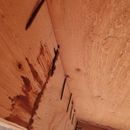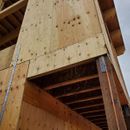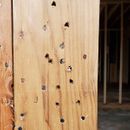Normal for code inspectors to disgregard nailing requirements?
Owner-building a new home in Anchorage, Alaska. My framer called in a muni inspection for the shear walls. The inspection noted that one interior shear wall hadn’t been built all the way up to the roof, but otherwise it passed.
The problem is… there were a lot of problems. Many of the shear panels were built with nails that are too short, too narrow, and significantly less strong in shear than those called for in the plans. Almost all of the Simpson seismic hardware on the outside of the house was installed with 1.5″ nails–a full inch shy of Simpson’s minimum. My designer and Simpson both confirmed that all of this nailing was inadequate and way out of spec.
Is it normal for this type of work to pass an inspection? Is it normal for inspectors to not ID nails or verify that they meet minimum requirements? We are in serious earthquake country here–in ’64 we had the second-largest earthquake recorded on earth, and over 100 people died. Year before last we had a 7.1 just a few miles north of here.
Not trying to blame one individual inspector here (he came back out to the site for a long time and made a thorough new report). But I’m really trying to understand why an inspection wouldn’t even try to catch these problems in the first place. So much research goes into how to design safe buildings, it seems weird to just fumble the whole thing at the very last step. Is this typical? Do you ultimately have to just inspect every nail yourself or hire third party inspectors to make sure homes are built according to plans?
GBA Detail Library
A collection of one thousand construction details organized by climate and house part













Replies
Muni inspectors often have wide authority to identify and require correction of defects, but little responsibility to do so. In some cases, this means that they just don't bother to do their jobs because they don't really have to. In other cases, they're simply overworked and/or undertrained. Even in the best cases, they only report on what they "see," and "see" is very undefined.
In my area (NJ), I routinely see Simpson hardware fastened with those little 1.5" nails. You can "see" that by looking for the number stamped on the head. But the local muni inspectors rarely call this out. If you're really having a good day, you might notice that a shearwall plan calls for real 10d common nails, but you see the heads of nailgun nails and you know that they're not the same. Over/underdriven nails can also be spotted if you look hard enough. But then again, most muni inspectors spend about 10 minutes in the house and just don't have time to look that hard.
All that said, hiring a third-party inspector can help. I do some of that work. But one of the few guarantees I make is that I'm not going to see all of the code deficiencies either. There's just too much going on during a build for anyone unfamiliar with the details to possibly catch everything. I will give a shout-out to the architects who perform construction supervision. Most architects will offer to do this on houses they have designed. Few owners agree to pay for that service. And yet, the Archies who did the design are the only ones who actually know what they intended.
You did mention that the muni came back and did a new report. That's good. This is generally my approach when I find important issues that were missed. A gentle nudge and a request to come back and look at a list of other "potential issues" often goes a long way. Helping them do their jobs better often gets you to where you need to be with a minimum of aggravation.
Of course your builder will rarely see it that way. In my area, "looks good from the street" is often the very best you can hope for. Good luck with the build.
Thanks for your response. I guess this is wishful thinking, but it would be so easy to require that shear walls be built with nails that have IDs on the heads (or have a requirement to tape an example nail to the wall so it could be checked). My experience makes me wonder how many other buildings in Alaska are built with totally out-of-spec nailing and hardware and will be more prone to failure in the next earthquake.
The code change in California in 2010 was difficult for inspectors. It seemed they were tasked with teaching the contractors the new code requirements for shearwalls. It was several years of learning. Here is a good book written by an engineer http://www.shearwalls.com/books/books.php on shearwall construction. Over 100 pages long.
It can depend on the background of the inspector & ICC credentials. Your engineer should be able to walk the building and make a correction list.
Here in California the answer to your question is NO they should be on every defect.
I wouldn’t trust the inspectors to find all important defects, especially hidden defects like “is the nail long enough?” I would, however, trust the inspectors to find annoying things that don’t really matter, especially if you have had any battles with the city in the past.
I’m a consulting engineer. I get contracted to figure out and fix other people’s problems (usually), and fix them. I have found MANY things missed by inspectors, other things inspectors made people do that were neither necessary or code required, attempts to “inspect” things that are under someone else’s jurisdiction (in Michigan, diesel fuel systems require state inspections, not local, but local mechanical inspectors sometimes try to inspect and pass/fail them anyway, which creates exciting and fun to watch turf wars, but usually no project delays), and all kinds of other things. I have seen inspectors catch less important things (dying batteries in obscure emergency lights that are difficult to reach), conduit straps placed just over 5 feet (code spacing) apart, and all kinds of other things while missing important stuff like a big girder supporting twin 14” steel pipes that was specified for a full perimeter weld but was only ever tack welded to the column.
The lesson is DO NOT rely on inspectors to catch everything. If you have the knowledge, actively check up on your project and all the trades involved. If you don’t have the knowledge, or want to be sure you’re not missing anything yourself, hire a good GC and/or ask your engineer and/or architect to come out to the site and check anything you’re worried about. I recommend weekly walkthroughs and project meetings on larger projects to my own customers.
You can always point out things that concern you to inspectors, but I’d check with your GC/architect/engineer first ALWAYS. The reason is that the people you hire aren’t likely to cause you problems, but inspectors sometimes will and most certainly CAN. Ask the inspector if you don’t like the answers you get from the people who you’ve hired, or if you don’t have the option to ask those people for whatever reason.
Bill
Paxton,
We have two routes to seismic compliance here: A prescriptive one using the building code, and having the building designed by an engineer. I find that the inspectors are good about checking code approved work, but abdicate responsibility for designs done under the professional licence of an engineer. To me that's as it should be. If an engineer does a seismic design, they should also make sure it's built in accordance with their drawings and specifications.
Malcolm, here in your friendly southern neighbor engineers can overrule inspectors with their seal. I agree, this is as it should be (would you want the city plumbing inspector to be the only one needing to sign off on an oil refinery? Probably not, you need people with more experience :-)
Is Canada different in it only being OPTIONAL for inspectors to step back on an engineered project design?
Bill
Bill,
In general that how it is here. There have been a few high profile instances where the governing authorities have dug their heels in, but usually if the inspector has engineered drawings, they only inspect the things not covered by the engineer's work.
As I understand it the courts have ruled that the homeowner is ultimately responsible that the house is built to code. The muni's have zero liability in that regard. No liability = less care.
I have seen inspectors walk up to the outside of a job without entering the structure, lean over a puddle by the door so they don't get dirty, and slap a passed sticker on the inside.
It's a government job, what would you expect?
etekberg,
I'd expect what I experience, which is diligence and professionalism. If a society has low expectations around the level of services their government will provide, that may end up to be what they get.
Sounds like that and $5 will get you a cup of coffee, if they are allowed to open up and serve it to you.
Sorry I don't understand the allusion.
Let’s try not to be too hard on the inspectors. It is a fine line they walk, he is an ass if he pick every nit and fool when he miss anything and everyone wants him to show up today.
As far as the driveway inspections go, if this inspector has a good history with this contractor in not finding problem his time may well be better spent at a site where he is more likely to find faults with unknown contractors.
I would encourage you to not embarrass or antagonize the inspector he can make your life very difficult if he decides to. I say ask lots leading questions and avoid telling him what you think.
To my eye there are way too many scrap of plywood used around that window. Ideally they would saw into the corner of the window and have L pieces of plywood.
In my mind you should be more upset with the contractor than the inspectors.
Walta
I have no problem at all with my individual inspector. He came back to the site for an intermediate framing inspection, spent a lot of time on the site, and wrote up most of the code violations in a 3-page report. My question was more about the system generally and why inspectors wouldn't check things like shear panel nailing--which has significant structural implications.
Believe me I am far more upset with the contractor than the inspector. No argument there.
Paxton,
I think there are some common misapprehensions about the role of inspectors. They are looking for general conformity with the drawings, codes and bylaws, but have no obligation to owners to make sure the contractors are doing good job. Perhaps an apt analogy is police enforcing speed limits. They detect and punish some speeders as a deterrent, but don't have an obligation to ensure no one speeds in their jurisdiction.
Inspectors are also unable to catch every last detail. Regarding a nailing schedule, it’s pretty easy to check fastener spacing and placement, but fastener length and type not so much — except for really obvious things like using finishing nails or something like that. Knowing if they used regular or actual structural screws is another.
You can usually expect the inspectors to catch most of the obvious problems (but not always all of them), but do NOT expect that they’ll catch every last detail, especially hidden things that aren’t obvious on quick visual look-see.
Bill
Bill,
Traditionally the architect was the owner's representative and looked after their interests. But since the '80s fee cutting has meant site visits were often reduced or eliminated from contracts. I've done designs for houses I've never seen except in photos - and something the photos were unrecognizable from what I had drawn. Who knows how they were built?